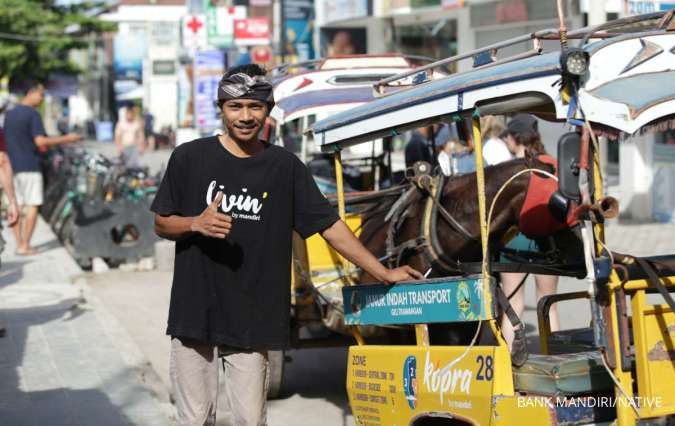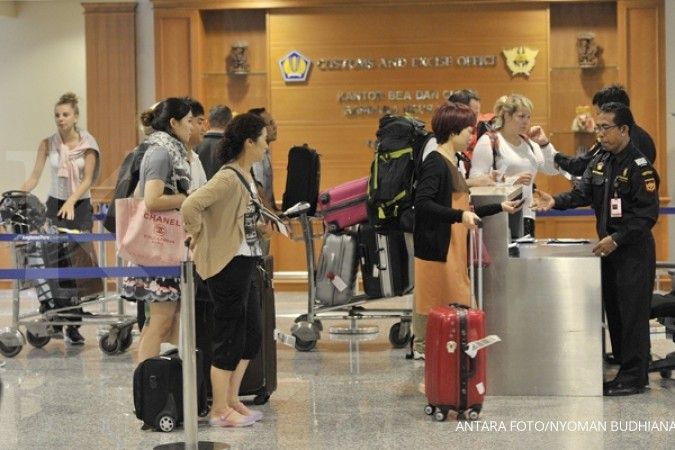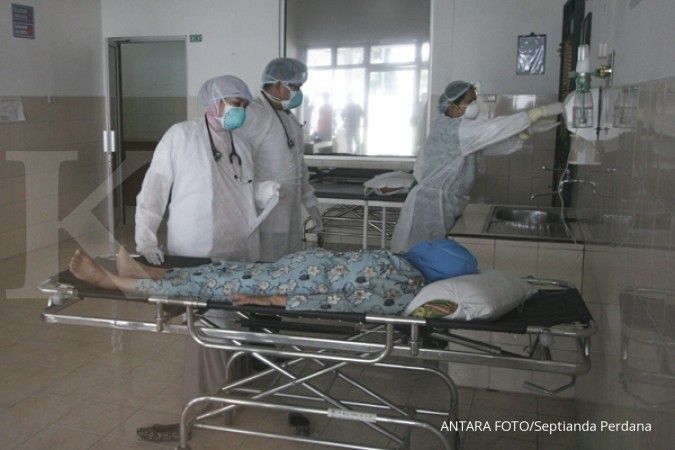JAKARTA. Despite the recent outbreak of the deadly Ebola virus in western Africa that has killed more than 1,200 people in Nigeria, Guinea, Sierra Leone and Liberia, Jakarta authorities are not overly worried about the possibility of the fatal virus spreading to Indonesia. Jakarta Health Agency head Dien Emmawati said the chance of the virus reaching the country was small. “Many western Africans come to Jakarta each month, but we highly doubt they will carry the virus to the city. Those infected with Ebola can hardly get up from their beds, let alone fly to another country,” Dien told The Jakarta Post on Wednesday. Western African merchants often come to Jakarta to visit the Tanah Abang textile market in Central Jakarta to buy wholesale fabrics and resell them in their hometowns. According to the World Health Organization (WHO), those infected by the Ebola virus will exhibit symptoms of a sudden fever, intense weakness, muscle pain, headache and sore throat. This is followed by vomiting, diarrhea, the appearance of a rash, impaired kidney and liver function and, in some cases, both internal and external bleeding. Ebola’s incubation period, which is the time interval between infection and the onset of symptoms, is two to 21 days. With a fatality rate of up to 90 percent, the disease is highly infectious and can be transmitted through physical contact with body fluids such as blood, saliva, urine, sweat and semen, among others. The WHO has declared the outbreak “a public health emergency of international concern” and recommends countries take preventive measures, such as strengthening surveillance at airports and issuing travel advisories. Despite the minimal risk of an Ebola outbreak in Indonesia, Dien said her agency had prepared three hospitals to treat patients with the aforementioned symptoms. “We have prepared the Sulianti Saroso Infectious Diseases Hospital in North Jakarta, the Persahabatan Hospital in East Jakarta and the Gatot Subroto Army Hospital in Central Jakarta,” Dien said. She added that the three hospitals had laboratories at the level-three bio-safety standard. A bio-safety level refers to the bio-containment precautions required to isolate dangerous biological agents in an enclosed facility. The highest level is four. “The medical workers must make sure not to get infected, but at the same time they have to do their best to treat patients,” Dien said, adding that next week, the Jakarta Health Agency would conduct workshops for private clinics in six municipalities on how to handle Ebola cases. She said that her agency had also intensified coordination with the Soekarno-Hatta International Airport management in Tangerang, Banten, to screen for infected passengers or virus carriers. General affairs manager of state-owned airport management company PT Angkasa Pura II, Yudis Tiawan, said the airport health office had installed thermo scanners in the 2D and 2E terminals at the airport to screen international arrivals. “The thermo scanners can detect each person’s body temperature. Those who are found to have a body temperature of more than 36 degrees Celsius will be taken to the airport health office for further examination,” Yudis told the Post. He added that the thermo scanners had also been used during the outbreak of the Middle East Respiratory Syndrome (MERS) earlier this year due to the great number of Indonesians making pilgrimage to Mecca and working in the region. “There are no direct flights to Indonesia from West Africa. They [passengers] must transit in Saudi Arabia or other Middle Eastern countries. I’m sure that Saudi Arabia has done its part to prevent the disease from spreading,” Yudis said. (Dewanti A. Wardhani)
Jakarta confident Ebola will stay away
JAKARTA. Despite the recent outbreak of the deadly Ebola virus in western Africa that has killed more than 1,200 people in Nigeria, Guinea, Sierra Leone and Liberia, Jakarta authorities are not overly worried about the possibility of the fatal virus spreading to Indonesia. Jakarta Health Agency head Dien Emmawati said the chance of the virus reaching the country was small. “Many western Africans come to Jakarta each month, but we highly doubt they will carry the virus to the city. Those infected with Ebola can hardly get up from their beds, let alone fly to another country,” Dien told The Jakarta Post on Wednesday. Western African merchants often come to Jakarta to visit the Tanah Abang textile market in Central Jakarta to buy wholesale fabrics and resell them in their hometowns. According to the World Health Organization (WHO), those infected by the Ebola virus will exhibit symptoms of a sudden fever, intense weakness, muscle pain, headache and sore throat. This is followed by vomiting, diarrhea, the appearance of a rash, impaired kidney and liver function and, in some cases, both internal and external bleeding. Ebola’s incubation period, which is the time interval between infection and the onset of symptoms, is two to 21 days. With a fatality rate of up to 90 percent, the disease is highly infectious and can be transmitted through physical contact with body fluids such as blood, saliva, urine, sweat and semen, among others. The WHO has declared the outbreak “a public health emergency of international concern” and recommends countries take preventive measures, such as strengthening surveillance at airports and issuing travel advisories. Despite the minimal risk of an Ebola outbreak in Indonesia, Dien said her agency had prepared three hospitals to treat patients with the aforementioned symptoms. “We have prepared the Sulianti Saroso Infectious Diseases Hospital in North Jakarta, the Persahabatan Hospital in East Jakarta and the Gatot Subroto Army Hospital in Central Jakarta,” Dien said. She added that the three hospitals had laboratories at the level-three bio-safety standard. A bio-safety level refers to the bio-containment precautions required to isolate dangerous biological agents in an enclosed facility. The highest level is four. “The medical workers must make sure not to get infected, but at the same time they have to do their best to treat patients,” Dien said, adding that next week, the Jakarta Health Agency would conduct workshops for private clinics in six municipalities on how to handle Ebola cases. She said that her agency had also intensified coordination with the Soekarno-Hatta International Airport management in Tangerang, Banten, to screen for infected passengers or virus carriers. General affairs manager of state-owned airport management company PT Angkasa Pura II, Yudis Tiawan, said the airport health office had installed thermo scanners in the 2D and 2E terminals at the airport to screen international arrivals. “The thermo scanners can detect each person’s body temperature. Those who are found to have a body temperature of more than 36 degrees Celsius will be taken to the airport health office for further examination,” Yudis told the Post. He added that the thermo scanners had also been used during the outbreak of the Middle East Respiratory Syndrome (MERS) earlier this year due to the great number of Indonesians making pilgrimage to Mecca and working in the region. “There are no direct flights to Indonesia from West Africa. They [passengers] must transit in Saudi Arabia or other Middle Eastern countries. I’m sure that Saudi Arabia has done its part to prevent the disease from spreading,” Yudis said. (Dewanti A. Wardhani)




